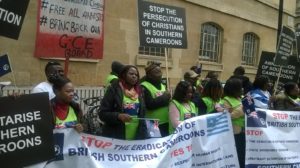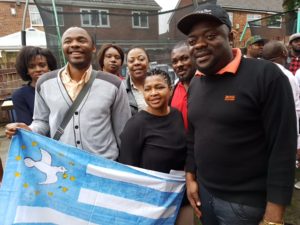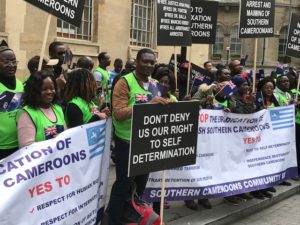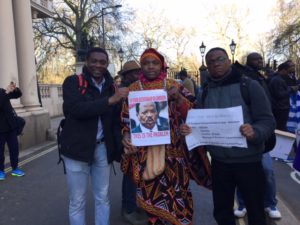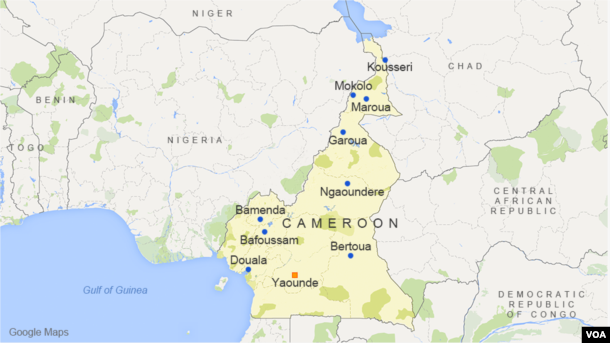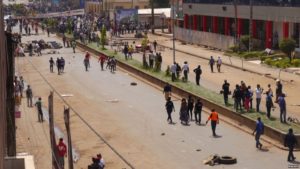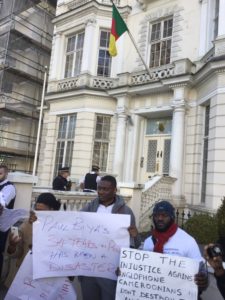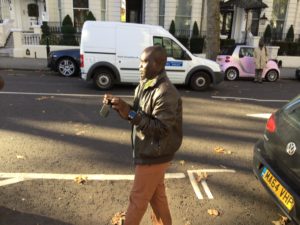THE BIRHT OF A NATION (AMBAZONIA)
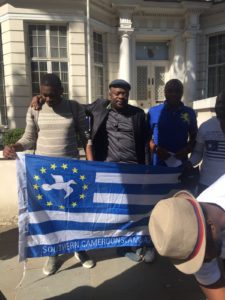
After the defeat of the Germans during World War 1, Southern Cameroon was administered by the British administrative traditions, educational and legal system (mainly the Common Law), system of government and management of the local community – which were all done and government by the British by indirect rule.
This therefore goes without saying that the main language of administration, governance and instruction in these parts is English and rightly so – likewise as French traditions and administrative system dominate the French speaking part of Cameroon.
Therefore, judging from the above brief assessment of the way both Cameroons were been administered and governed traditionally, any form of social and economic unrest in an area where English is the main language suggests that there is an issue and only fair to conclude that it is an Anglophone problem within its own right – based on its roots and heritage! This however does not equally imply that, Anglophones have a problem because they are Anglophones but solely because the people feel abandoned, segregated, marginalised, ignored and been treated for long as “second class citizens” – for lack of a better expression! Some of the reasons for this Anglophone problem have been discussed below:
- Official name of the country
One of the most frustrating issues of the Anglophone problem is found in the official name of Cameroon. The name of this country: La République du Cameroun as subtle as it might seem is a potential source of the destruction of the country in its current state of affairs.
Going back to the beginning, it is worth-noting that prior to the British and French administration of the Cameroons in 1961, the part that was governed by the French was called La République du Cameroun. But when both parts came together and were united as one, the country was called the Federal Republic of Cameroon. Note the use of the word ‘Federal’ – as this denotes the recognition that at least two political entities had decided to federate.
Three years later, i.e. 1972, the name of the country was now changed to the United Republic of Cameroon albeit against the spirit of the Foumban accords that led to the 1961 federation, however, the term UNITED still was a reminder that there was more than one political structures, identities or entities were not in unity.
This now brings us to the current issue as the name of the country is La République du Cameroun – which clearly highlights if not project the fact that there is no remnant or reminder of Cameroon comprised of two political entities that came together. This is also the exact name of French Cameroon before the federation. I guess the question now remains: what became of the English speaking Cameroon or the Anglophones? Are we no longer part and parcel of this so called “marriage”?
It is for this reason that some Anglophones feel that they have been suppressed, occupied or simply erased from the country entirely.
- The language of the law
Another deliberate projection of institutional aberration from the spirit of the 1961 union is that the French mannerisms, language and culture significantly buttress the conception of laws in Cameroon. Inasmuch as the constitution evidently stipulates that Cameroon is a bilingual country, never in the history of Cameroon has a law been presented to the National Assembly in English first. In cases where laws are proposed in both English and French versions, the English version is a translation and as in the case of the revised Penal code tabled in 2016 – the legal implications and quality of the English version is a clear indication of the level of competence (or lack thereof) of the translator.
The undergirding problem here is that if laws are systematically conceived in French, it goes without saying that its application, interpretation and implementation will based on the traditions inherited from the French with no regard for the English traditions and culture. I guess the next question now is this: how is this legal system fair towards the Anglophones especially when the cultures and interpretation of the law is already biased from the unset!
- Administrative
This is the one that is really painful and embarrassing to say the least and makes the heart of every educated Anglophone to have their hearts sinking. A country with over 30 Ministries has the inscription of the various names of the ministries in French first, then followed by English underneath mostly with smaller characters, as if was an irrelevant footnote. These are some of the trivial issues that most people might not notice unless they are Anglophones or an activist of equality and human rights.
That notwithstanding, even the websites of the over 30 Ministries are in French and in most cases, the English version is either not updated, not available or Google translated. Information, when made available to Anglophones is therefore not news or is in such poor and inappropriate English that is tantamount to an insult as if there are no educated Anglophones who would have done a better job.
The final example is Cameroon’s relations with the Commonwealth, which could and should have been noticed by members of the Commonwealth of nations. The Head of State has never deemed it necessary, important or vital to attend a Commonwealth Summit but unfailingly attends Francophonie summits which seem to be more important to him than African Union Summits. The presence of the French president at Francophonie summits and the extent of French investment in Cameroon and the diplomatic cards that may be played at these summits may be a factor in the Head of State’s decision to attend. But then, his non-attendance of Commonwealth summits begs the question of why a similar economic rapprochement is not made with countries of the commonwealth or is English Cameroonians not that important for their plights to be heard or benefits to be shared with the rest of the commonwealth member states?
- Language of communication
Firstly, inasmuch as the current (Paul Biya) and former Heads of State (Late Hon. Ahmadow Ahidjo) have made numerous speeches lasting over 50+ years, inasmuch as the current Head of State has made some small parts of a handful of speeches in English, no Cameroonian Head of State HAS EVER made a full speech in English. As a matter of fact, Anglophone Cameroonians do not know what it feels like for citizens to hear their so-called Head of State make a full speech in their first official language which could be equated with “seeing a pig fly”
Secondly, no key decisions, appointments, laws or any legal procedures or any state matter has ever been published or announced in English first; nor are Anglophones aware of any such decision for which the French version is only a translation.
There’s a major radio newscast at 3pm in English and a major radio newscast at 5pm in French. There is also a major TV newscast at 7:30pm in English and a major TV newscast at 8:30pm in French all of which are either on the CRTV radio or Television. Critically looking at it and not being biased, could the government of La Republique honestly confirm to the public that for over 50 years, all major decisions have been made between 3:30pm (after the radio news in English) and 5pm (before the radio news in French) or between 8pm (after TV news in English) and 8:30pm (before TV news in French) and thus announced in the next available newscast which happens to be in French? This would be a coincidence that has never and will never happen on planet earth. How convenient!
Another critical element is the fact that the language used on Bank Notes in Cameroon does not a single word in English printed on any of them – could there ever be a scenario in human history where the term marginalisation could be better used? This remains a problem that Francophone Cameroonians cannot complain about except by solidarity – this constitutes an Anglophone problems!
- Lack of economic development in English speaking Cameroon
Nothing of a major economic benefit to the people of West Cameroon have gained any interest from the government even when the resources are there to be developed. The Menchum fall comes to mind as an example. Research conducted has suggested that the Menchum fall, if harnessed could provide electricity to the whole of Central Africa. Any reasonable government, taking into account the frequent power failure in Cameroon would jump to this opportunity to make the lives of its citizens better and attract businesses, investments and economic growth. But because this is found in Southern Cameroon, no one cares.
- Economic headquarters of most if not all corporations and enterprises have been moved out of the area. A good example is the headquarters of the CDC from Buea to Yaounde. This is the definition of what marginalisation looks like for real
These injustices are real and they affect real people especially the Anglophones. They are so systematic that they seem obviously deliberate and ultimately criminal. It is true that Honourable WIRBA quoted Thomas Jefferson… but I want to quote Honourable WIRBA: When injustice becomes law, resistance becomes a duty”. It is the injustices above that Anglophones are RESISTING hence the cry of an Anglophone problem!
BY PRIDE MBI AGBOR ASG SCNC UK



